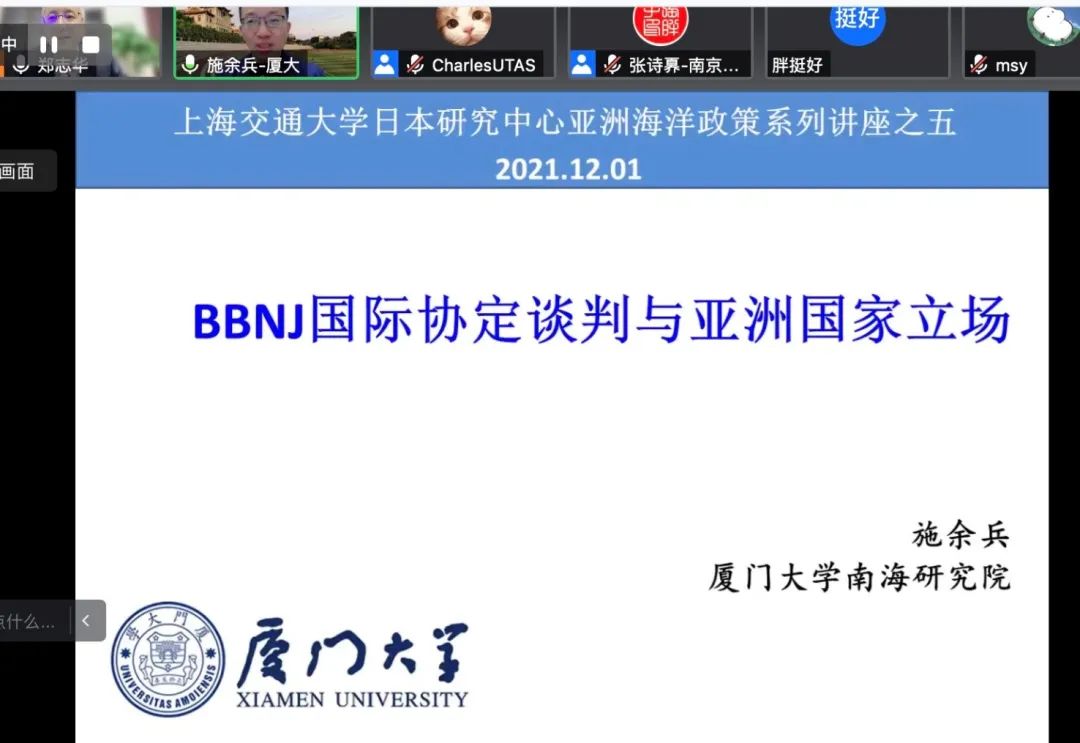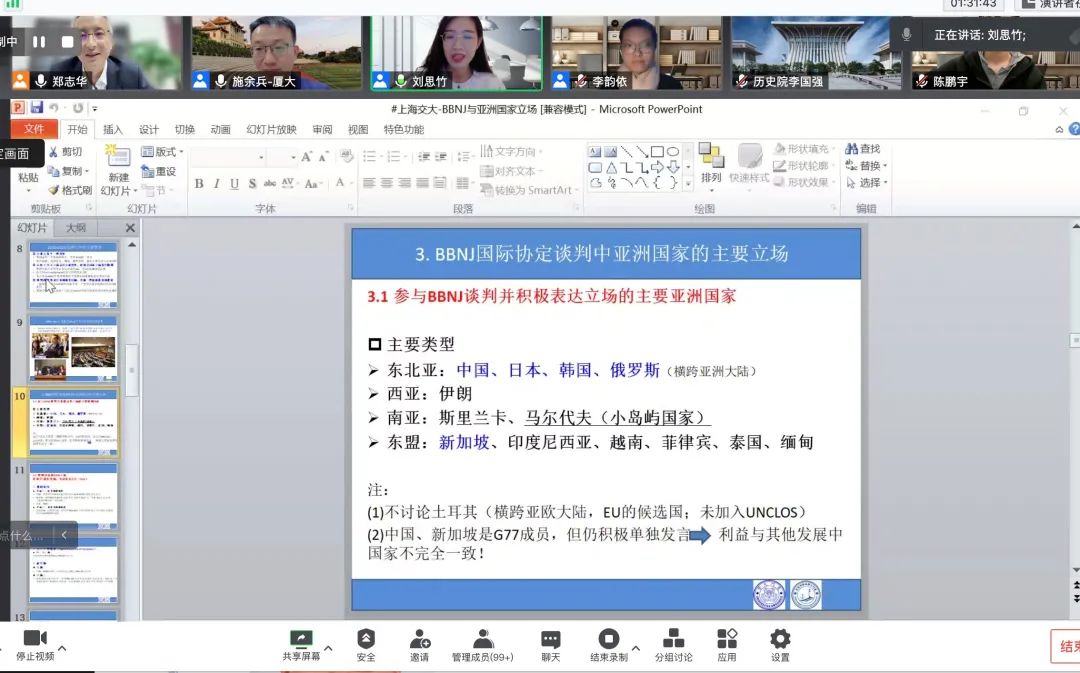On December 1, 2021, the fifth lecture of the series of lectures "Asian Ocean Policy" by the Japan Research Center of Shanghai Jiaotong University, "BBNJ International Agreement Negotiation and Asian Countries' Position", was successfully held online. Professor Shi Yubing, Vice Dean of South China Sea Research Institute of Xiamen University and Chief Editor of China Ocean Law Review, was invited as the keynote speaker of this lecture, and Liu Sizhu, postdoctoral student of Fudan University Law School, Li Yunyi and Chen Pengyu, doctoral students of Kaiyuan Law School of Shanghai Jiaotong University, were invited as the speakers. Zheng Zhihua, associate researcher of Japan Research Center of Shanghai Jiaotong University, presided over the lecture. More than 130 experts, scholars and graduate students from Tsinghua University, Zhejiang University, Ocean University of China, Xiamen University, Nanjing University, Sun Yat sen University, Hainan University, East China University of Political Science and Law, Shanghai University of Political Science and Law, Wuhan University, the Chinese Academy of Social Sciences, the People's Police University of China, the Marine Development and Strategy Research Institute of the Ministry of Natural Resources and other institutions attended the report.

Zheng Zhihua first introduced the keynote speaker Professor Shi Yubing and the three interviewers, and extended a warm welcome to Professor Shi Yubing and all the experts, scholars and students who participated in this lecture. Zheng Zhihua said that the BBNJ international agreement negotiation is the most important legislative process in the field of international law of the sea at present, and is related to major issues such as the use, distribution and protection of the sea areas beyond international jurisdiction. Professor Shi Yubing, as a legal expert of the Chinese delegation, participated in the BBNJ international agreement negotiation all the way. He has both rich first-hand practical experience and profound theoretical knowledge. He believes that Mr. Shi's lecture will certainly bring new thinking and inspiration to everyone.

Professor Shi Yubing explained in depth the main issues of BBNJ international agreement negotiations and the relevant positions of Asian countries from the aspects of what is the marine biodiversity issue in the sea areas beyond national jurisdiction, why we should regulate the marine biodiversity issue in the sea areas beyond national jurisdiction, the latest progress of BBNJ international agreement negotiations, the positions of Asian countries, the thinking and evaluation of relevant issues, etc. Professor Shi pointed out that with the progress of technology, human beings have caught marine organisms more frequently, causing increasingly serious damage to marine organisms, especially microbial diversity. However, international legislation such as the United Nations Convention on the Sea (UNCLOS) and the Convention on Biological Diversity have not regulated this. Although IMO, FAO, RFMO and other industrial organizations have some relevant legislation, due to the lack of cooperation and coordination mechanism, the effect is not significant. At the same time, the practice of relevant high seas reserves has not achieved good results due to different standards. Professor Shi believes that at present, several factions have formed in the BBNJ negotiations, such as the free use faction, the benefit sharing faction, and the maritime regulation faction. On the whole, there has been no major change in the positions of all parties, and the problems and differences are relatively prominent. Some new proposals and suggestions have emerged in the specific operational level. Asian countries, especially China, Japan and the ROK, actively participated in the negotiations and made important contributions to the setting of topics and the orientation of positions. However, Asian countries are very diverse. There are obvious differences in the positions of many countries in the negotiations, and their voice is relatively weak. In the future, Asian countries, especially those in Northeast Asia, can consider forming corresponding national groups. Collective voice in negotiations may better safeguard their own interests and enhance their voice and influence.

In the talk session, Liu Sizhu pointed out that by reading the latest text of the draft agreement, he found that the principle of "common heritage of mankind" was replaced by the new expression of "human beings as a whole", and it is worth noting the differences that these two expressions may bring. At the same time, she believes that the concepts of "a community with a shared future for mankind" and "a community with a shared future for the sea" proposed by China are similar to the purposes of "the common heritage of mankind". How to extend these two concepts to the text of the Convention, especially in the field of utilization and distribution of marine genetic resources, is worth studying.

Li Yunyi believes that the concept of a community with a shared future in the sea can point out the direction for the BBNJ agreement negotiation and system design. For example, for the benefit sharing of marine biological genetic resources, the community of interests and responsibilities should be emphasized; In terms of the management tools for marine protected areas and other areas, it is necessary to reflect a way for all countries to bear the common responsibility for the protection and preservation of the marine environment, rather than as a means of marine enclosure.

Chen Pengyu believes that the guidance function of Europe and the United States cannot be ignored in the BBNJ agreement, and the interests and positions of China, Japan and the ROK are similar, so we can consider forming a national group to play a greater role in the negotiations. In addition, she was concerned about the impact of the BBNJ Agreement on the existing international fisheries management system. Subsequently, Professor Shi made an incisive response to the questions and comments of the interviewers.

Finally, Zheng Zhihua expressed his gratitude to Professor Shi Yubing for his wonderful speech and the wonderful talks with the three speakers, and his admiration and appreciation for the breadth, density and depth of knowledge embodied in the lecture. He believed that with the development of the times, the core issues focused on by the law of the sea had gradually shifted from traditional "freedom" and "sovereignty" to "utilization" and "protection". The BBNJ international agreement negotiation formally reflects this new era theme. The United Nations Convention on the Law of the Sea (UNCLOS) is a product of the 20th century. Professor Shi Yubing's lectures have brought many inspirations in terms of whether the UNCLOS can effectively address various marine issues within the original framework of the Convention, how to achieve effective governance of the global oceans, and how to improve the voice and influence of Asian countries. He also expects that you will continue to pay attention to the "Asian Ocean Policy Series" held by the Japan Research Center of Shanghai Jiaotong University in the future.
